8 Best Car Sharing Mobile Apps: Market Overview
It’s more than likely that the days of traditional car rentals are numbered, as carsharing programs are growing in popularity at a tremendous pace. This article describes the current state of the carsharing market, provides a list of the most successful operators in this field and discovers top rated car sharing apps
What are car sharing apps?
Car sharing applications are mobile apps that allow people to find and rent cars, and pay for them online. These apps provide a convenient, fast service, due to features like mobile payments, maps, geolocation, and of course IoT that connects vehicles to software. In this article, we’ll talk about how you can build a profitable business with car sharing app development and get inspiration from the top-rated car sharing apps.
Car sharing allows people to forgo the costs and responsibilities of car ownership and decreases the amount of time that cars spend unused in the driveway. The principal benefits, beyond the sharing aspect, include the opportunity to monetize personal vehicles and real-time matching of supply and demand.
Shared car takes about 13 privately owned vehicles off the road.
Car sharing also means fewer cars on the road, less traffic congestion, and more available parking spots in urban areas. According to Zipcar, the shared car takes about 13 privately owned vehicles off the road, while Zipcar members reduce CO2 emissions by nearly 500,000 tons a year.
Unlike traditional car rentals, car sharing offers self-service. Users go to a predetermined parking spot to unlock a shared car, drive it to their destination, and then return it to the designated place. Car sharing vehicles can be rented by the minute, by the hour, and by the day.
The state of the car sharing market
As of today, cars haring services are present on all continents except Antarctica. Asia is considered the region with the most car sharing, accounting for about 40% of all car sharing vehicles globally. Europe comes in second, with over 30% of the global fleet operating in the region. The car sharing market in North America ranks third.
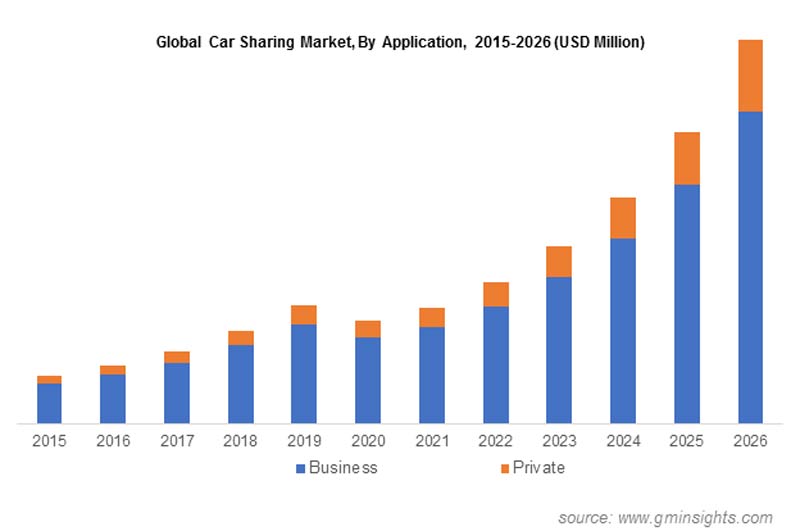
According to Global Market Insights, the global car sharing market will reach $9 billion in valuation by 2026, growing at a CAGR of over 24%. In 2019 it was only $2.6 billion.
Most early car sharing programs were founded through university research, subsidized by the government, or started as small private companies. Today, car sharing companies are able to operate and expand through acquisitions by large car rental companies. There are also car sharing companies owned by car manufacturers: car2go (Daimler), DriveNow (BMW), Maven (General Motors).
The impact of COVID-19 shutdown on the car sharing market
The pandemics has hit many industries hard, and the news from car sharing companies indicate that the car sharing industry is also cautious of the changes. General Motors, for example, have suspended operating fleets of publicly shared vehicles in North America. Zipcar stopped providing car sharing services in British Columbia, and other car sharing businesses report that people are making fewer trips during the quarantine.
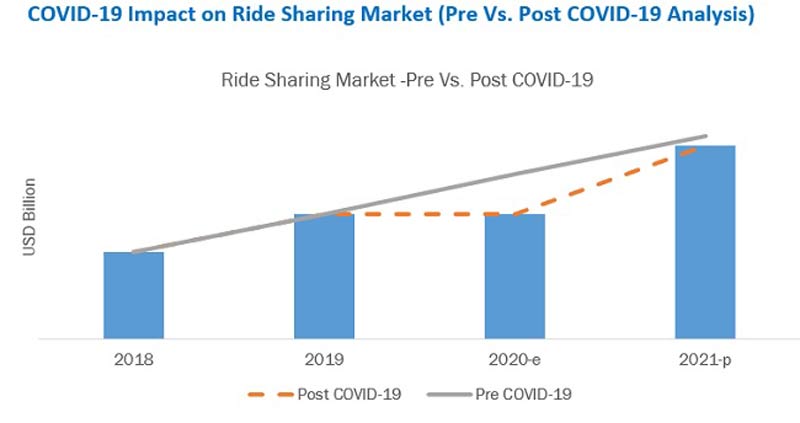
The reason car sharing businesses are now suspending their operations is this: the maintenance costs are too high, and the revenue from users doesn’t cover them. However, experts say that this doesn’t mean the end of car sharing: because of the pandemics more people will prefer individual transport to public one, and will opt to use car sharing.
Still, when implemented properly, car sharing really helps to reduce congestion and pollution. However, the world after the pandemics, at least in the next couple of years, won’t be exceptionally welcome for car sharing services on the premium side.
How do car sharing apps work?
A car sharing application facilitates the whole process of renting a vehicle, from finding it to finishing the ride. First, a user needs to upload their documents (usually a driver’s license) and get it approved. Then, they also need to connect their payment method to the app as well.
After that, a user gets access to the service. They need to check a map and find the nearest vehicle, and then reserve it, so they make sure it’s there when they get to it. Now it’s time to unlock the car. Different car sharing services will have different procedures: some will send you a membership card that you can use to unlock the car, while others will allow you to unlock it right with your mobile phone. For unlocking, they’ll use RFID or NFC technologies.
Then, a user can get to their destination and finish a ride. The cost will be automatically withdrawn from their credit card.
Car sharing vs car rental
We can say that car sharing is just a type of car rental. What makes it different from traditional car rental though, is it’s used for short-term rides, usually up to several hours. In car sharing, people only pay for the usage, either by time or distance traveled.
Another benefit that only car sharing can provide, is the ability to rent a vehicle at any time of day and night. Traditional rentals are only available during business hours and are inconvenient if you just need a car for a few hours.
Types of car sharing programs
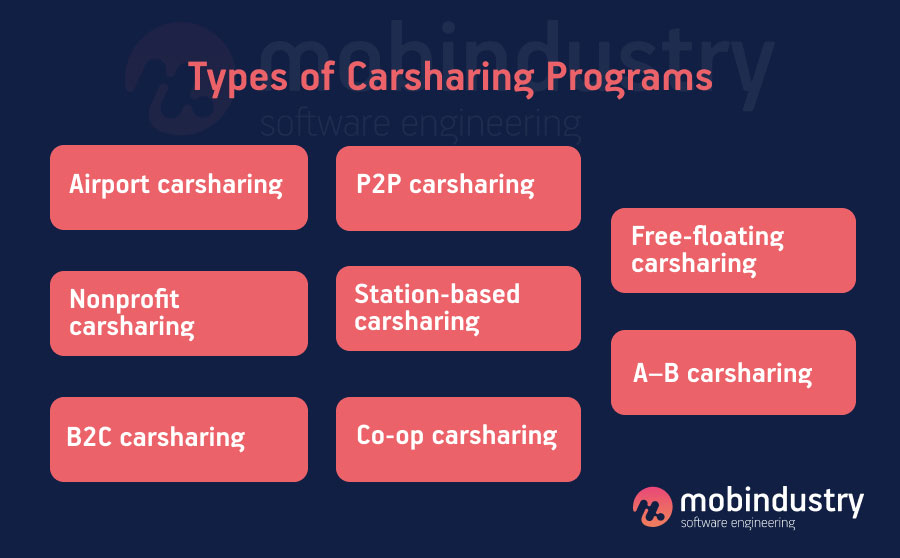
Car sharing programs can be divided into the following categories based on their business applications:
Peer-to-peer car sharing, or P2P car sharing
Peer-to-peer car sharing, or P2P car sharing, allows car owners to rent out their vehicles for short time periods, allowing car owners to receive passive income while they aren’t using their vehicles. Examples of the P2P car sharing model are Turo and Drivy.
B2C car sharing
With B2C car sharing model, drivers can rent a car owned by a private car sharing company directly instead of dealing with a rental agency. These car sharing operations include car2go, DriveNow, Zipcar, and Maven.
Airport car sharing
Members of airport car sharing programs leave their cars parked at the airport while on vacation and allow other travelers to use their vehicles until they’re back. Companies that operate solely in this segment include BeeRides in Hungary and TravelerCar and Tripndrive in France.
Nonprofit car sharing
Nonprofit car sharing operators such as eGo CarShare support the use of shared vehicles for social and environmental purposes.
Co-op car sharing
Members of co-op car sharing can co-own a vehicle and share costs for its repair and refueling. This sharing model also applies to corporate and residential car sharing programs.
Examples of the P2P car sharing model are Turo and Drivy.
In turn, B2C car sharing can be subdivided into three types: station-based, free-floating, and A–B car sharing.
Station-based (or roundtrip)
Station-based (or roundtrip) car sharing programs require members to begin and end their trips at the same location, usually paying on a per-hour or per-day basis.
Free-floating car sharing
Free-floating car sharing services have many pick-up and drop-off points within free-floating zones, allowing users to begin their trip at one location and end it at another near their destination. These car sharing operations typically charge on a per-minute basis.
A–B car sharing
Members of A–B car sharing programs can start their trip at point A and end it at some other designated point B. These programs usually include EV fleets and ensure that trips end near charging stations.
Although station-based car sharing prevails, while free-floating car sharing is a growing segment. Nevertheless, membership in one-way platforms is constantly increasing, as providers of free-floating services usually don’t charge membership fees but use pay-as-you-go models. Peer-to-peer programs have also experienced huge growth in the past years.
The key advantages of car sharing
- Reduces fuel costs and parking fees
- Reduces traffic fumes
- Provides better air quality and lowers carbon emissions
- Reduces congestion
- Increases the chance of finding a parking space
Top 8 car sharing apps in 2023
- Sixt
- Zipcar
- Turo
- Getaround
- SHARE NOW
- Enterprise CarShare
- Flinkster car sharing
- Urbi
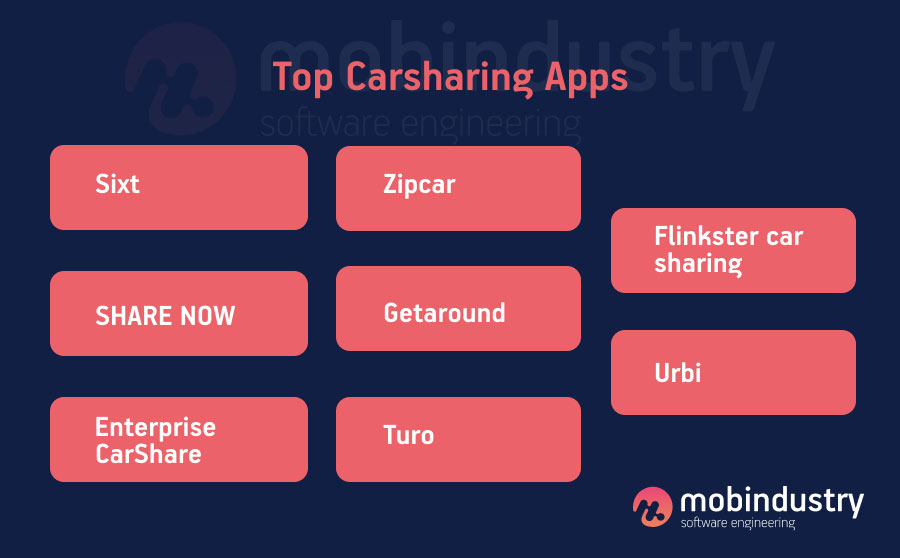
Sixt
Google Play rating: 4.8
App Store rating: 4.9
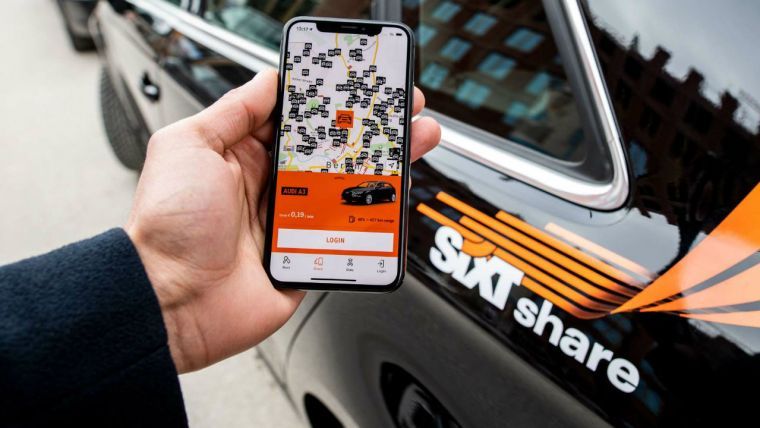
Sixt is Germany’s leading mobility provider, with about 2,000 stations in more than 100 countries. The company operates primarily in two segments – vehicle rentals and car leasing – but also offers a number of other transportation services such as car sharing and ride-hailing. This product range is supported by innovative internet-based and mobile services. The company’s business model is B2B and B2C.
The majority of the company is still owned by the Sixt family, which manages the company. Sixt fleet exceeds 4,500 cars. In 2018, Sixt’s total revenue reached 2.9 billion euros.
Market: Sixt is considered the largest car rental company in Germany. In 2011, Sixt began operating in the USA. Sixt franchises also operate in Eastern Europe. Sixt serves business and corporate clients, as well as private individuals.
Sixt is Germany’s leading mobility provider, with about 2,000 stations in more than 100 countries.
Features & winning points: Sixt’s mobile app comprises SIXT rent, SIXT share, and SIXT ride. Thanks to the large Sixt fleet (trucks, luxury sedans, sports cars, SUVs, etc.) customers can always find the right option for their needs. Sixt share offers flexible rentals from one minute up to 27 days. The Sixt app allows customers to manage multiple profiles with just one login and provides detailed information about cars and reservations.
Zipcar
Google Play rating: 3.7
App Store rating: 4.5
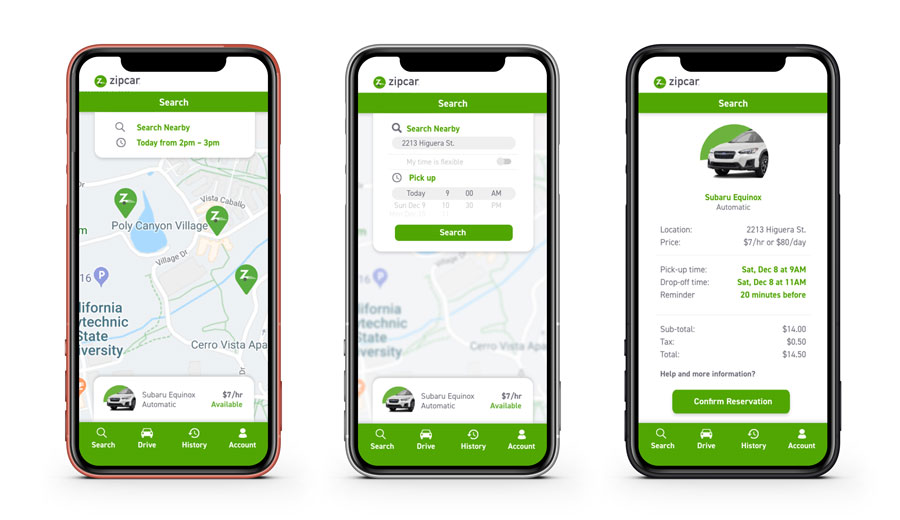
Zipcar is the best known station-based car sharing service in North America. The company brings in $278.9 million in estimated revenue annually. With its wide variety of self-service vehicles available by the hour or day, Zipcar provides on-demand access to more than 12,000 vehicles in metropolitan areas and on college campuses. Zipcar’s rental fleet includes Audis, BMWs, Mini Coopers, pickup trucks, and Prius hybrids. According to the company, a Zipcar is reserved somewhere around the world every six seconds.
Market: Besides the US, Zipcar is present in Canada, several European countries and Taiwan. Altogether, Zipcar operates in over 500 cities and on over 600 college campuses and offers both round trips and free-floating service.
Features & winning points: The Zipcar mobile app makes finding and reserving Zipcars easy. A user can honk the horn to locate a reserved car and unlock the doors through the smartphone.
By signing up for updates and reminders, Zipcar members can get all the info they need about their reservations and can extend a trip by up to 30 minutes on the go.
Turo
Google Play rating: 4.9
App Store rating: 4.8
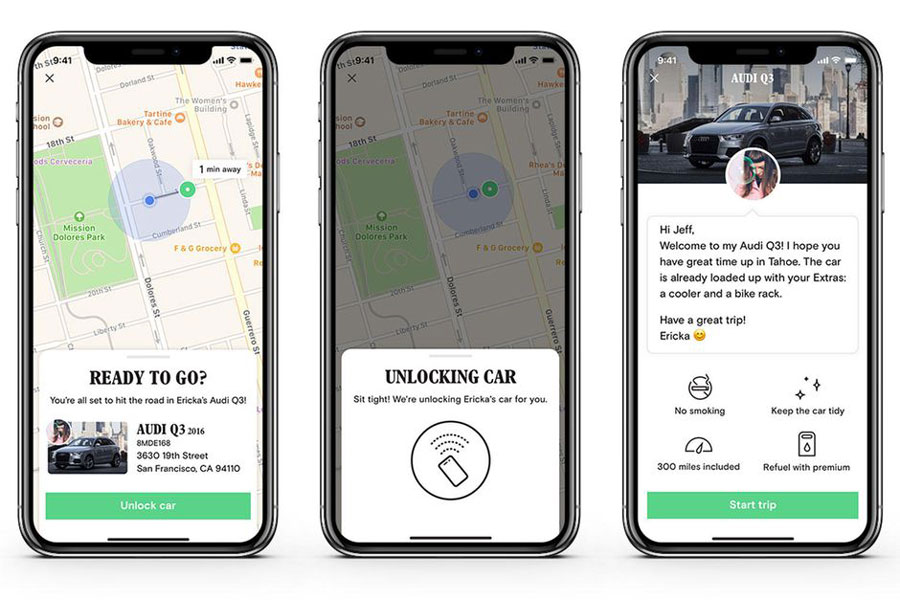
Turo is a peer-to-peer cars haring company. Previously known as RelayRides, the company underwent a complete rebranding in 2015, followed by a name change and shift to a long-term rental and travel service. With this app, you can rent cars from people. Turo allows private car owners to rent out their vehicles online and via the Turo app, and travelers can choose cars suited exactly to their needs as opposed to what’s available on the rental lot. Turo claims more than 200,000 vehicles are listed on its service and more than 5 million users are registered on the platform.
In 2015, Forbes included Turo among the 14 hottest on-demand startups, with a valuation of $311 million. Turo’s estimated annual revenue is $10 million.
Turo takes 10 to 35 percent of rental revenue, which is a smaller amount compared to the competition.
Market: As of today, Turo offers its service in 56 countries, including Canada, the UK and Germany.
Features & winning points: Turo offers a simple user experience for car owners. There’s no hardware installation required, though the company did introduce Turo Go technology in one of their latest updates. This program gives renters and owners the ability to lock and unlock a vehicle via the Turo app, along with access to other special features such as tracking the car’s fuel level and odometer.
Turo takes 10 to 35 percent of rental revenue, which is a smaller amount compared to the competition.
The Turo app prompts renters to document the car’s condition thoroughly at the beginning and end of each Turo Go trip. This provides protection for the owner in case something goes amiss during the drive.
Getaround
Google Play rating: 3.7
App Store rating: 4.7
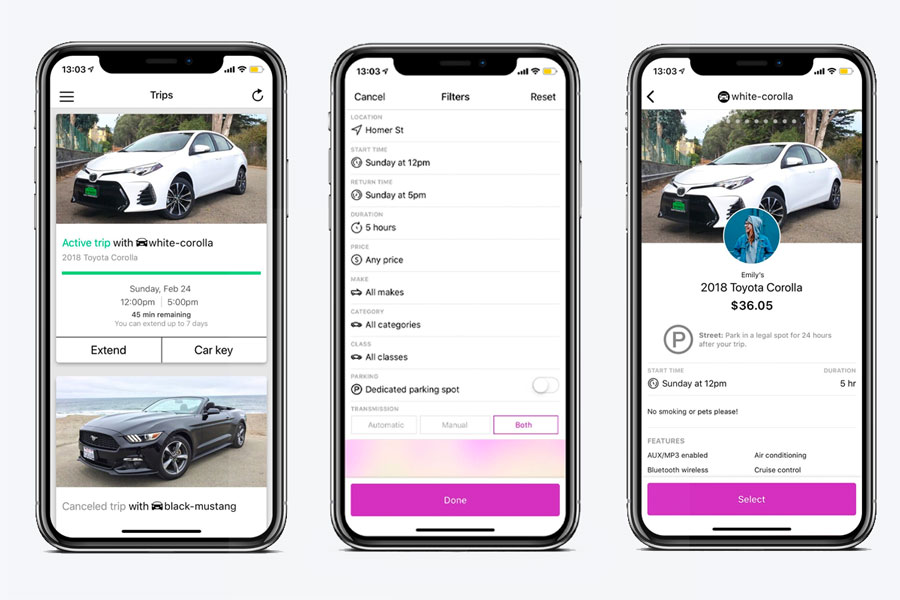
Getaround is a peer-to-peer car sharing marketplace in San Francisco that allows private car owners to offer on-demand car rentals to renters. For car owners, it’s a way to make passive income when they aren’t using their vehicles. According to Getaround, drivers typically make $300 to $500 per month renting out their cars. In turn, renters get easy and affordable access to a wide selection of newer model vehicles with less than 150,000 miles. Once an owner and their car is approved for sharing, Getaround installs its hardware in the car, which allows it to be unlocked with the app.
Getaround has revenue in the tens of millions of dollars and continues to grow. Some of the company’s other investors include Menlo Ventures, Braemar Energy Ventures, Cox Automotive, and actor Ashton Kutcher.
Market: Getaround currently operates in thirteen metro areas, including Boston, Chicago, Portland, Seattle, Los Angeles, and Washington, D.C.
Some of the company’s other investors include Menlo Ventures, Braemar Energy Ventures, Cox Automotive, and actor Ashton Kutcher.
Features & winning points: When users apply to join Getaround via the app, the company verifies their driver’s license and credit card. After getting verified, users can reserve cars. Reservations last from 15 minutes to seven days and start as low as $5 per hour with no membership fees. Customers use the app to unlock the car, and trips start and end at the same location.
Owners receive 60% of the total rental revenue – the rest goes to Getaround. It’s easy to make $500 to $1000 per month with this service, meaning the potential for upwards of $10,000 per year.
SHARE NOW
Google Play rating: 3.6
App Store rating: 4.7
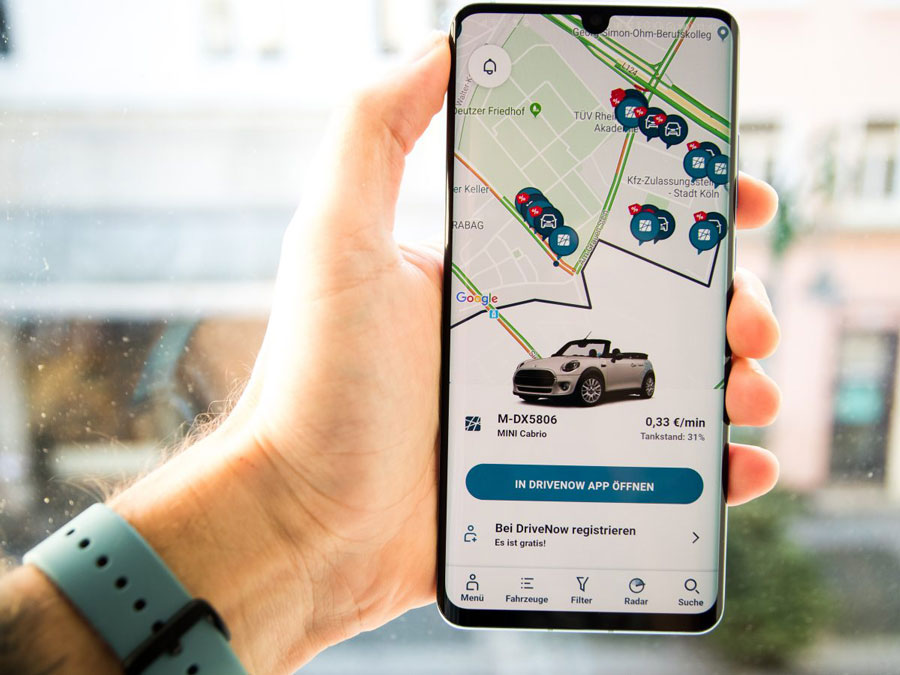
DriveNow and Car2Go merged and became SHARE NOW – an international on-demand car sharing company that operates in 18 cities in 8 European countries. They manage a fleet of thousands of vehicles across Europe. The company offers only Smart, Mercedes-Benz, BMW, Mini, Fiat and Citroën vehicles and arranges one-way point-to-point rentals.
Features & winning points: The SHARE NOW app allows users to unlock a car with a swipe and choose Touch ID/Face ID (iOS) or fingerprint ID (Android) so they don’t need to enter their PIN each time they use the SHARE NOW service.
The SHARE NOW app can also connect with the navigation system in the cars. Thanks to this, users don’t need to enter their destination address manually.
Another SHARE NOW app feature called Car Radar automatically searches for a nearby car.
Enterprise CarShare
Google Play rating: 4.5
App Store rating: 4.8
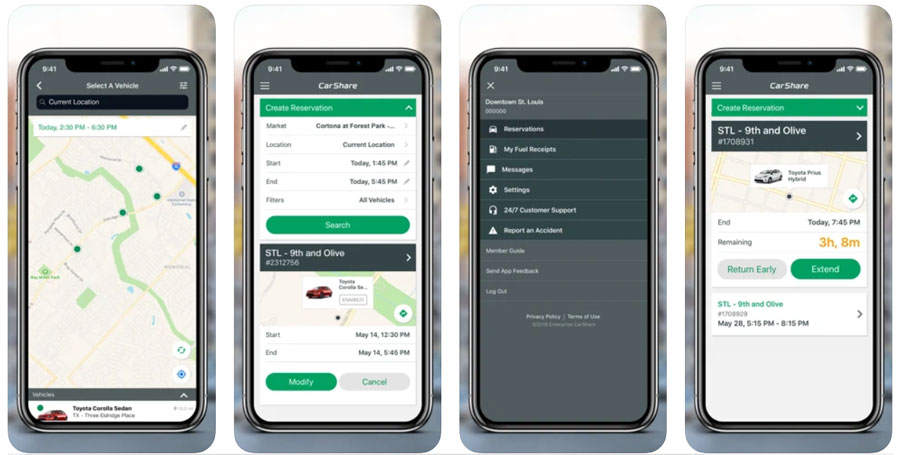
Enterprise CarShare is a membership-based car-sharing service that allows users to rent cars or other vehicles at any time. To use this application, a user should be a member of the service. After becoming a member, a user gets access to these features:
- car reservation
- car reservation management
- extend car rent reservation
- ability to submit fuel receipts via an app
- access to 24/7 member service support
Flinkster car sharing
Google Play rating: 3.1
App Store rating: 4.8
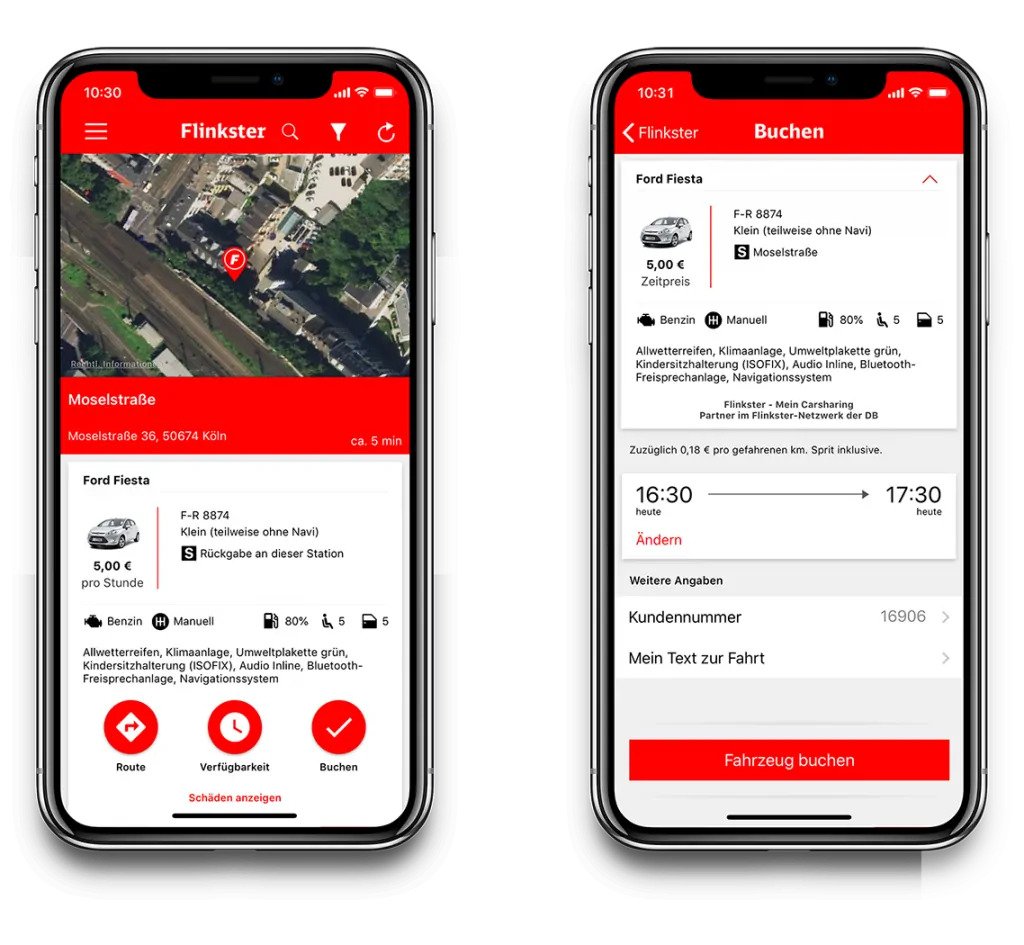
Flinkster is Germany’s largest car sharing service that boasts over 4,000 vehicles and infrastructure of 1,700 stations in over 300 cities. The stations are situated in all kinds of locations from railway stations and airports to rural areas. The car-size also varies depending on the location and your needs. They have one of the best car sharing apps in Europe.
The most important features of Flinkster are:
- maps that allow users to easily locate vehicles nearby
- vehicle booking, both in advance or spontaneously
- ability to change or cancel bookings
- car access
Urbi
Google Play rating: 4.0
App Store rating: 4.1
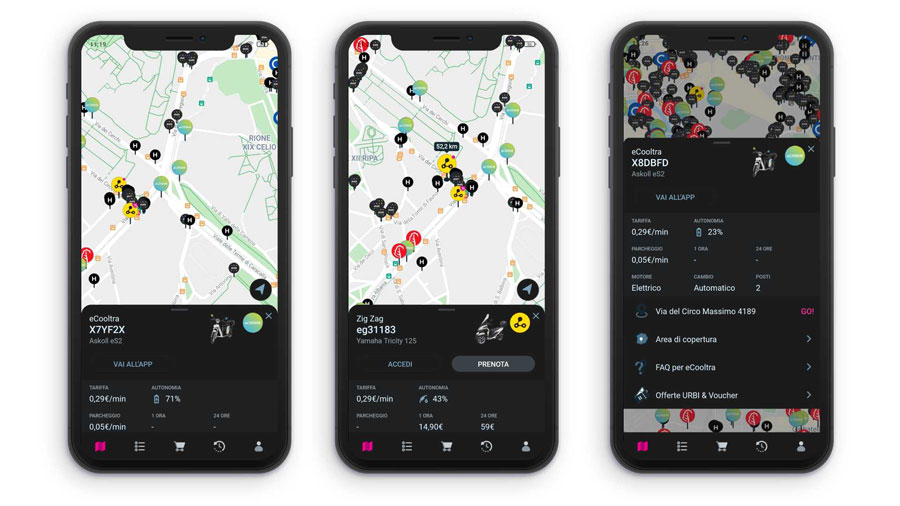
Urbi is neither a station-based car sharing platform nor a free-floating service. Rather, it’s a convenient solution for long-term users of shared mobility. Urbi combines existing car sharing services in one app. Created by two computer experts primarily for their own use, Urbi is an app designed to resolve mobility sharing complications. It provides an overview of all car sharing operators in the area and detects the nearest available means of transport and calculates the best route.
Urbi doesn’t store users’ login data on its servers.
Market: Urbi works across a range of top car sharing services (car2go, DriveNow, Emio, Multicity, SharenGo, Sixt) in the majority of European countries and the United States.
Features & winning points: The Urbi app contains several handy features, including a fare calculator and a “radar” feature. The latter enables notifications about vehicles available nearby. The fare calculator shows the best price and best time options for a requested trip. Urbi provides locations of parking and gas stations as well as an offline map with the nearest Wi-Fi hotspots. Another interesting feature allows users to refresh the data by shaking the phone. Urbi doesn’t store users’ login data on its servers.
Best car sharing startups for locals
Here’re a few startups that have the potential to become the best car rental sharing app.
Ithaca Carshare
It is a local nonprofit organization. Ithaca Carshare’s main goal is to enhance community access to transportation and reduce the negative environmental and economic impacts of car use.
Gig
Gig is a one-way car sharing for the Bay Area and Sacramento. To use a vehicle, users need to create a free profile, find a car nearby and unlock it with the phone. GiG is also known for its eco-friendly approach. It provides its users with eco-friendly hybrid cars and fossil-fuel-free electrics.
Ego
Ego CarShare is a car share rental app for nonprofit services. It is the best app for car sharing in Colorado. The company’s goal is to make a positive impact on the environment and locals’ health, wealth, and community.
Hui
This car share ride app was developed by Toyota Connected and Servco Pacific Inc. This car sharing startup is working on the territory of Hawaii islands. Hui is a round-trip, station-based car sharing app startup where people can book a car by the hour or day, now or in the future. Cars are available 24/7 and users don’t have to pay a fee or pay a subscription. People only pay for the time they were using the vehicles.
What should you expect in the next few years?
Car sharing market experts forecast growth of the car sharing sector through 2025, when approximately 36 million drivers are expected to use car sharing services worldwide. Two main factors will lead to this growth. The first is the millennial lifestyle, which embraces all the perks of the sharing economy. Younger people tend to share everything nowadays, from living spaces and workspaces to bikes and kayaks.
Another thing to expect during the next decade is the addition of self-driving vehicles to car sharing fleets. A study by ABI Research suggests that 400 million people will rely on robotic car sharing services by 2030.
The second force that will ramp up the shift to vehicle sharing is advanced app development technologies. Apart from existing keyless vehicle access and reservation systems, car sharing providers are halfway to integrating parking navigation and blockchain technologies. It’s only a matter of time before cars haring operators adopt the electric mobility concept completely. Another thing to expect during the next decade is the addition of self-driving vehicles to ca rsharing fleets. A study by ABI Research suggests that 400 million people will rely on robotic car sharing services by 2030.
Summary
As you can see, the car sharing market is populated by players with different cars haring models and modes of operation. Startups and large companies backed by automotive manufacturers offer their services in both local and global markets. Even though station-based programs have a lot of members, free-floating companies appear to be more viable and sustainable in light of modern transportation trends. However, it’s the peer-to-peer system that corresponds best to the concept of car sharing and doesn’t require a dedicated fleet.
It’s also important to mention that vehicle sharing couldn’t have gotten this far without integrating the latest technologies. Features offered by the best car sharing apps make the whole car rental process easier and faster. If you’re interested in custom car rental app development, be sure to contact us: we build apps for micro-mobility and car rentals.

